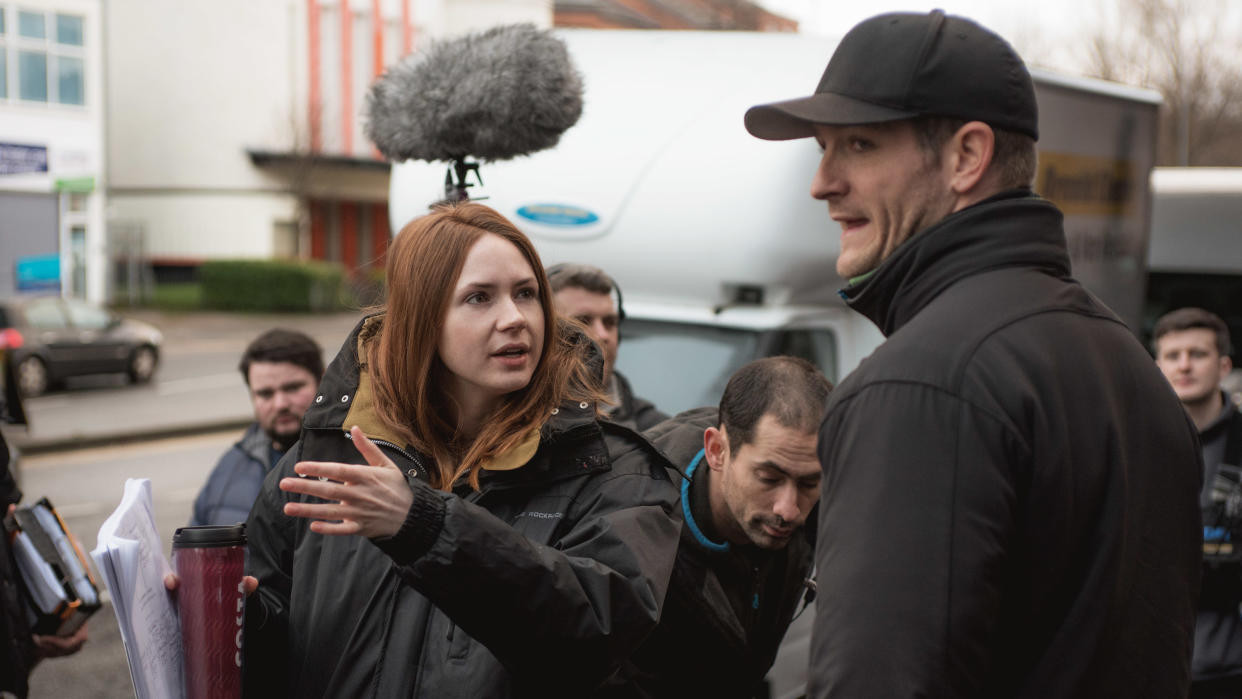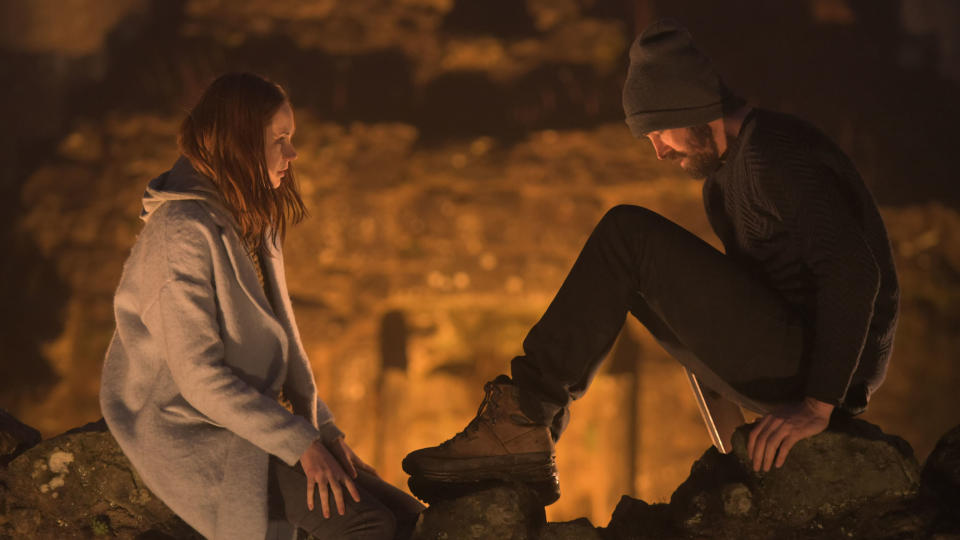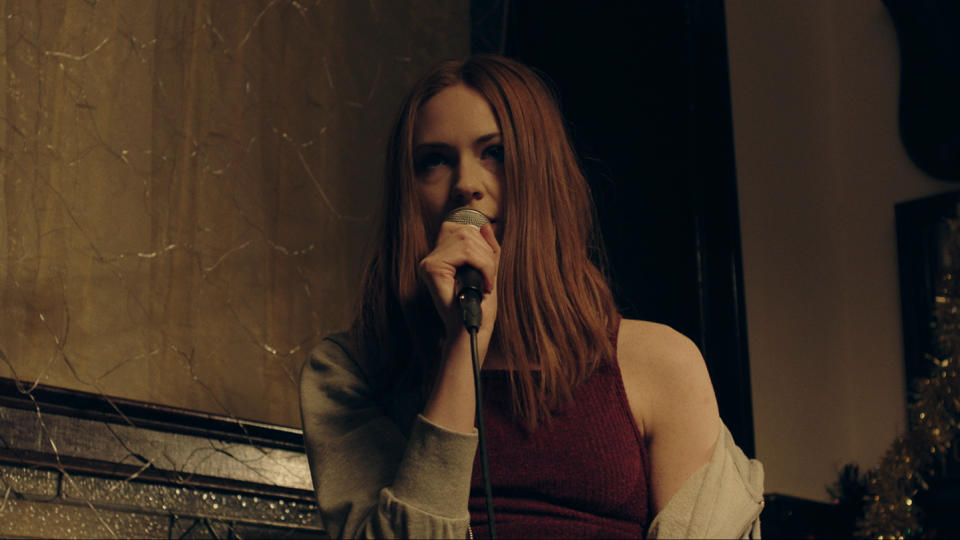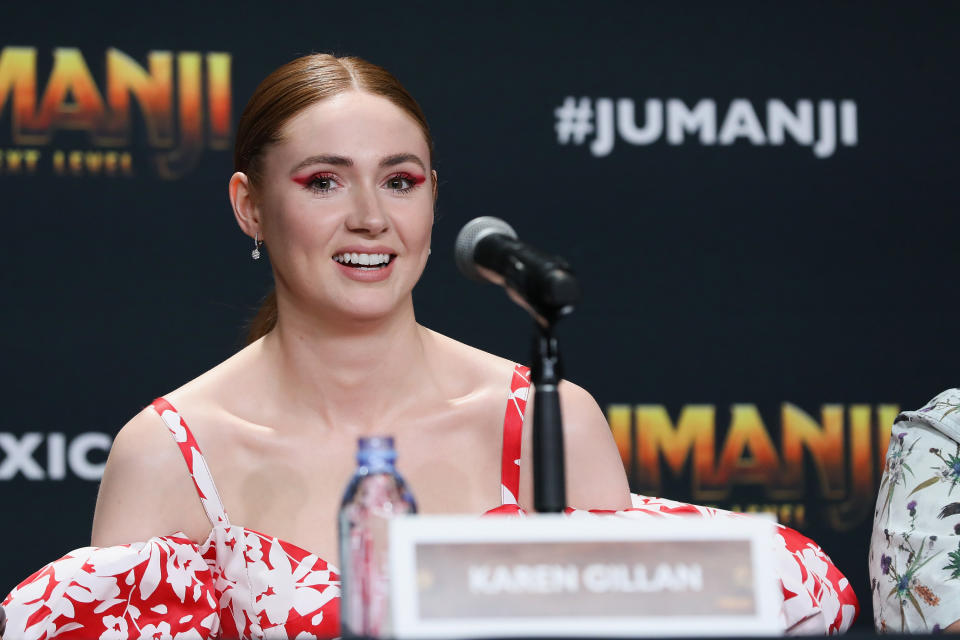Karen Gillan wants to start a conversation about mental health with 'The Party's Just Beginning'

Karen Gillan hopes her directorial debut The Party’s Just Beginning can help British audiences start talking about mental health and suicide.
The former Doctor Who star and Marvel Cinematic Universe regular has stepped behind the camera for the first time with the story of a young woman in Inverness — Gillan’s own hometown — struggling to pick up the pieces after her best friend takes his own life.
After shooting in early 2017 and premiering on the festival circuit in early 2018, it has been a long road for the movie to return home and the 32-year-old actor-director says it feels like she has come “full circle” from making films on a “clunky old video camera” as a kid.
“The whole context of our film is very much based on that area and that part of the world, so it would’ve felt weird to not use the real place in the movie,” she tells Yahoo Movies UK. “I’ve just never really seen it on screen before, so I wanted to put it on screen.”
Read more: Actors turned directors discuss making the switch
Gillan was inspired to write the script when she discovered a statistic revealing that a person takes their own life in the Scottish Highlands once every 10 days.
She is keen for the movie to start a conversation about mental health, particularly for men.

“It’s something we need to be talking about,” says Gillan, “and the issue itself is that I think a lot of men aren’t able to talk about it.”
She adds: “They have a hard time expressing vulnerability because there’s a stigma attached to it.
“I think we need to talk about that, try to break that down and create that safe environment where men really can express vulnerability. Then we might have a chance at addressing the issue.”
Read more: Chris Hemsworth suffered anxiety early in career
It’s a laudable aim for an ambitious first feature, but Gillan is never one to duck a challenge.
Read the full interview with Karen Gillan in which she discusses returning home to Inverness and the freedom of directing yourself, as well as her MCU role as Nebula and forthcoming sequel Jumanji: The Next Level.
Yahoo Movies UK: What was it that made you want to make the shift from acting to directing?

Karen Gillan: Well it’s something that I’ve always wanted to do since I was a kid. When I was growing up in Inverness in Scotland, my parents gave me this clunky old video camera and it was my prized possession. It was my favourite thing in the world and I would go around making all these films. They were mainly horror films. So I was kind of writing and directing even back then at 12 or 13. It was just amazing and in some ways a lot harder because I didn’t have any way of editing the material, so I literally had to get it right. Now I have the luxury of editing, so everything’s slightly easier.
Then I became an actor. I guess I always harboured a desire to be more of a storyteller, express my style and have more control over the whole project. Even though I do love being an actress and I’m never going to not love that, sometimes it’s nice to be the person telling the story in your way.
You mentioned growing up in Inverness. How important was it to be able to depict your hometown on the big screen?
It was really important to me. I feel like it’s a big part of my identity as a person. Growing up and making those films, it felt like it had come full circle when I returned home. The whole context of our film is very much based on that area and that part of the world, so it would’ve felt weird to not use the real place in the movie. I’ve just never really seen it on screen before, so I wanted to put it on screen.
Why, for your first film, did you feel the need to focus on subject matter which is quite difficult and that people might struggle with?
It’s based on a statistic that I read that a person in the Highlands takes their life every 10 days. So that kind of lodged in my brain for years. I thought it was strange because it’s such an idyllic place to live and so it’s a strange contradiction and there was definitely a story to be told. I knew that it would be my first film and I wanted to tell it from a female perspective. That’s where it all first came from.

As the time goes by, we’re learning to talk more, specifically about male mental health. Do you hope this film can start a conversation?
Definitely, that would be the best outcome, if we could even start a conversation about it. It’s something we need to be talking about. The issue itself is that I think a lot of men aren’t able to talk about it. They have a hard time expressing vulnerability because there’s a stigma attached to it. I think we need to talk about that, try to break that down and create that safe environment where men really can express vulnerability. Then we might have a chance at addressing the issue.
I think one of the other issues that comes across in this film is that human beings struggle to talk about death. How important was that idea in the film?
It was very important. A big part of the conversation with suicide is the people left behind afterwards. I wanted to capture that feeling a little bit, as authentically as I possibly could. There are many emotions connected to suicide for the people who have been left behind. She’s struggling with a lot of those and I think it’s something I haven’t seen on screen very often.
I wanted to talk also about your character’s relationship with sex. When the film starts, her interactions are almost funny but, by the end, they take on a real darkness. How did you go about communicating that element of the story?

I think that’s exactly it. She’s the type of girl that you might not even think twice about if you saw her on a night out. I think she desperately wants to connect with people, but she doesn’t have any communication skills. She can’t even talk to her parents. That’s part of the overall theme of the film — a lack of communication is a huge contributing factor to the suicide issue. She can’t connect with people, so she does that on a night out.
Obviously you’re wearing a lot of hats in this film as writer, director and star. Were you always going to play the lead character?
I was always planning on playing the lead character, right up until the last minute. I was like “whoa, I really want to concentrate on being the director and it would be really great to bring in an actress and let me sit behind the monitor”. So I tried to pitch that, which didn’t go down very well with my producers. So I was like: “You know what? I agreed to do this and I’m gonna see it through”.
Read more: James Mangold explains movie title change
Also, it had its moments because I had free rein on the character. It was amazing to have complete freedom as an actress. I was given so many options and there was nobody telling me not to do things, which was kind of fun. I really enjoyed the amount of freedom that I had. It’s not the way I’d always want to work, but I certainly enjoyed it on this film.
I wanted to ask about the title. It was referred to as Tupperware Party during the production and then was changed later on. Why was this the one you ultimately went for?
It was because the brand Tupperware did not want to be associated with this film! [laughs] I can understand why; they’re quite a wholesome brand. So they did not grant our wishes to use that. But I think it was for the best. There was more of a Tupperware party in the film which I ultimately feel is better left out. So I think the newer title is better for the finished film.
It’s such a British film, so how has it felt for there to be such a long gap before it made its way over here?

To be honest, I’m quite used to waiting for a long time for films to come out. This has been quite a long time, but it’s normal to shoot something and then years later it surfaces. But I’m just happy it’s here. It’s quite hard to make a film and then get distribution, so I’m really pleased that people are going to see it in its home country.
You’ve got this first feature directing gig under your belt now. Have you caught the bug? Will you be back behind the camera?
I think so. Earlier this year, I made another short film, which is more in the horror genre. So I think that’s where I’m going to be next year. I’ll probably be making some sort of horror film.
That’s exciting! Do you have any desire to direct a bigger film? You’ve been in some huge movies as an actor.
I’d like to direct a middle-budget horror film. I think that would be good. I feel like I could really use that extra budget to up the production values and the visuals and make more interesting choices. But yeah, I wouldn’t mind going up a budget level.
The next thing we see you in is Jumanji: The Next Level. I think the first film kind of surprised everyone. Suddenly it was one of the most exciting movies of the year. Can we expect more of that in the sequel?
It was an amazing experience to watch Jumanji [Welcome To The Jungle] go from what it was to then what it became. I think this one is even better than the last one.
Read more: First reactions to Jumanji sequel
Truly, somehow Jake Kasdan [writer and director] has managed to top it. It’s a brilliant concept because we have different players playing the avatars.
So it’s a little bit like rep theatre where you’ve got the same group of actors playing different characters. It’s new and exciting. I saw the movie and it’s laugh-out-loud funny. It’s brilliant.
The Party’s Just Beginning is in UK cinemas from 1 December, and on Digital Download 11 December.

 Yahoo Movies
Yahoo Movies 
